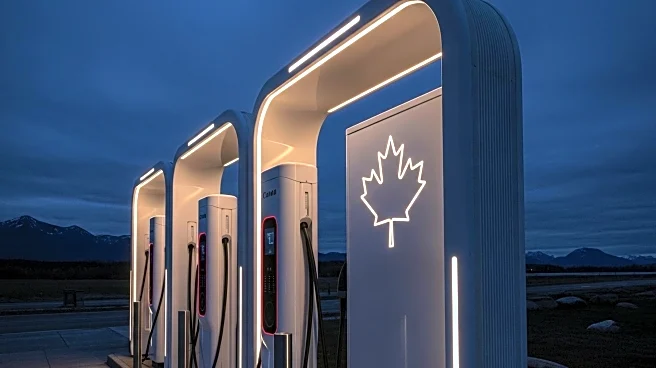What's Happening?
Prime Minister Mark Carney has announced a pause on Canada's electric vehicle (EV) sales targets for 2026, while advocating for a 'Buy Canadian' policy. This decision comes as Canada's economy shows signs of weakening, with a loss of 66,000 jobs in August and unemployment rising to 7.1%. The EV mandate, initially set by former Prime Minister Justin Trudeau, required 20% of new car sales to be electric by next year. Carney's new policy will prioritize Canadian-made goods for federal contracts and establish a fund to support firms in developing new products. The pause on the EV mandate is part of a broader strategy to manage the impact of U.S. trade policies, including tariffs imposed by President Trump.
Why It's Important?
The pause on EV targets and the push for a 'Buy Canadian' policy reflect Canada's strategic response to U.S. trade policies, including tariffs on foreign vehicles and Canadian goods. These measures aim to bolster domestic industries, particularly in auto, steel, and aluminum sectors, which have been adversely affected by U.S. tariffs. The policy shift could influence investment decisions in Canada's automotive sector, as businesses may reconsider their plans amid regulatory uncertainty. Additionally, the move highlights the economic challenges Canada faces, including job losses and rising unemployment, necessitating a focus on strengthening domestic production and trade resilience.
What's Next?
Canada will conduct a 60-day review of the EV mandate rules, potentially leading to further adjustments in the country's clean energy and automotive policies. The government is also seeking to restart trade talks with the U.S., aiming to secure relief for affected industries. Support measures for canola farmers are expected, following China's imposition of duties on Canadian seed imports. These developments indicate ongoing negotiations and policy adjustments as Canada navigates its economic relationship with the U.S. and other international partners.
Beyond the Headlines
The policy shift underscores the broader geopolitical dynamics affecting trade and environmental policies. Canada's decision to pause EV targets may have implications for its climate commitments, as it balances economic pressures with sustainability goals. The 'Buy Canadian' policy could foster nationalistic sentiments, influencing consumer behavior and domestic production priorities. Additionally, the interplay between U.S. tariffs and Canadian policy responses highlights the complexities of international trade relations in the context of economic nationalism.










